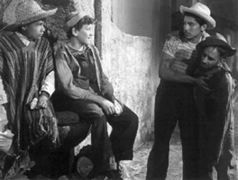Los Olvidados
Mexico 1950, 81 min.
Director: Luis Buñuel
Producer: Ultramar Films (Oscar Dancigers)
Screenwriters: Luis Buñuel, Luis Alcoriza
Director of Photography: Gabriel Figureoa
Music: Rodolfo Halffter, based on Gustav Pitalluga
Cast: Stella Inda, Miguel Inclán, Alfons Mejía, Roberto Cobo, Hector Lopez Portillo, Salvador Quiros, Victor Manuel Mendoza.
Awards: Best Director Award and International Critics Prize at Cannes (1951)
|

|
"If only misery could be imprisoned instead of them."
The first "great" Mexican film was shot by Buñuel in 1950. A surging wave of neorealism was then making its way through Europe, and The Forgotten are clearly influenced by it.
The dimension of social criticism (i.e. the aim to represent truthfully the vicious circle of human misery) is present in The Forgotten from the very beginning. At first the camera shows several world metropolises, all of them seedbeds of misery and despair. But Buñuel approaches the painful reality ("The film tells the story of real people and events") in his own original way.
His film (in spite of the theme which virtually asks for it) never turns into moralizing or fiery accusation of the society and the guilty ones who are part of it. The director voluntarily leaves the purely factual and therefore rational line and explores more abstract dimensions of human existence.
It is the clutching hand of fate that acts as a sinister force controlling the whole story and consuming the heroes. The fate of the forgotten as predestination to eternal misery or to a tragic end is personified in the character of Jaibo. It is him who kills both Julian (he found hope in an honorable job) and the protagonist, Pedro (in the children´s home he had met the first man who has ever trusted him and lent him money, but Jaibo stole it = the fatal conflict). They both attempted to step out of the vicious circle, they were both killed by Jaibo, who in spite of his cowardice and meanness is painted in nearly demonic contours in the film.
In some scenes Buñuel does not "content" himself with mere realism and gets to a naturalist level. The film has no hero - for misery is an illness, fatal and mortal. There are two scenes in which "ill" boys meet ill representatives of the world of adults. With cynical sadism they beat up and humiliate not only the blind man, but also the man without legs. Buñuel´s sense of cruelty resounds in the fierce struggle of the humiliated.
Dream as Buñuel´s motif par excellence becomes an important element to undrestand the relationship between Pedro and his mother. Pedro´s urging feeling of being an outcast is materialized in the question “Why didn´t you give me meat?” in an almost surrealist scene (later when the mother is passing it to him, ghostly Jaibo gets hold of it). In comparison with his early films this "surrealist" passage seems rather unorganic - the space-time of The Forgotten is, in spite of the above described Buñuelisms, basically realistic.
Hens (inferior, “forgotten” birds in a way) are another recurring motif. They appear in the above mentioned dream scene and later they fall victim to Pedro´s furious attack.
"Why don´t you make a real Mexican film instead of such a crap film like this one?” (a technician working on The Forgotten - illustration of the "response" to Buñuel´s film)
"Buñuel chooses the most cruel only because the real problem is not the knowledge that good exists as well but the awarness of how far human fate can get in mischance; it means to plunge into the cruelty of creation.” (André Bazin)
Plus:
Buñuel admired De Sica´s Sciuscia - probably one of the key inspiration sources...
Before the shooting the director walked through Mexico´s shanty towns in disguise during 4-5 months and observed the life of the real “forgotten”
The film was shot in 21 days (exactly according to the plan)
In Mexico the film not only flopped at first, but it even unleashed a storm of sharp and crushing controversy for "dishonoring" Mexico
The Forgotten were given absolution in its country of origin only after echoes of success in whole Europe and a praising article by the Mexican poet (and classic) Octavio Paz
Links:
IMDb - record in the internet film database
[ translation: Sabina Poláková ]
|
|